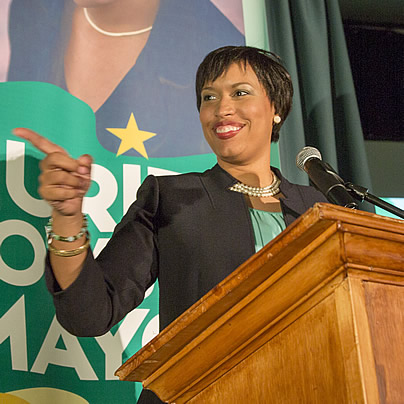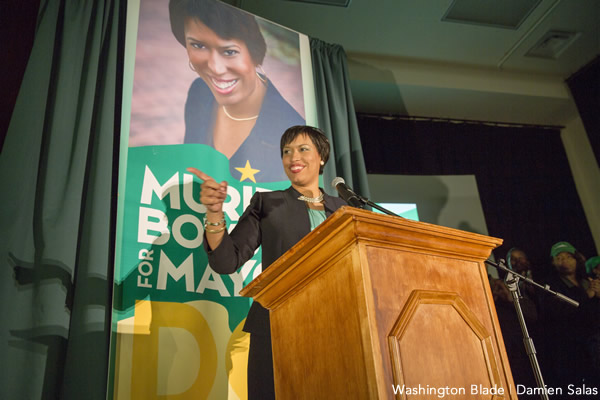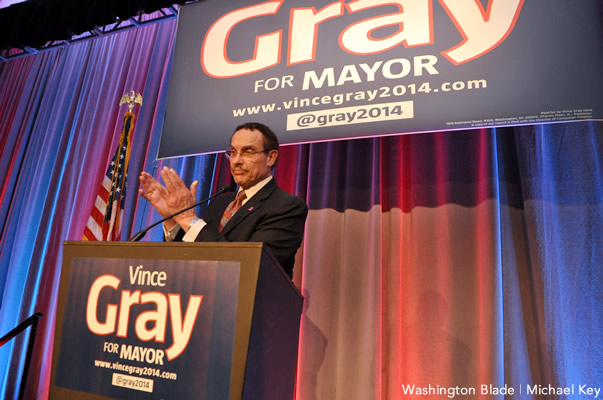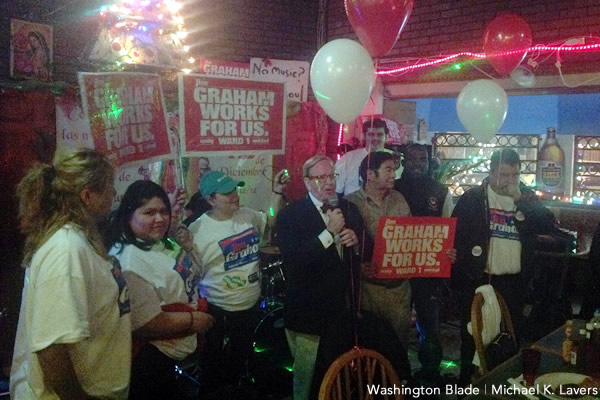Local
BOWSER TOPPLES GRAY
Graham loses; prospect of no gay representation on Council


Council member Muriel Bowser defeated Mayor Vince Gray, setting up a contest with gay Council member David Catania in November. (Washington Blade photo by Damien Salas)
D.C. Council member Muriel Bowser (D-Ward 4) won 13 out of 16 precincts believed to have high concentrations of LGBT residents in her victory over Mayor Vincent Gray and six other candidates in the city’s Democratic primary on Tuesday.
In final but unofficial returns released by the Board of Elections and Ethics, Bowser had 44 percent of the vote compared to 32 percent for Gray in one of the city’s lowest turnout elections.
Bowser’s decisive win created deep disappointment among the large number of LGBT activists supporting Gray, many of whom consider him the nation’s most LGBT supportive mayor. His initiatives on transgender equality earned him strong and loyal support from the transgender community.
Although Bowser had a strong showing in voter precincts with high concentrations of LGBT residents, some activists backing Gray said they would take a careful look at gay Council member David Catania (I-At-Large), who will be running against Bowser as an independent candidate in the November general election.
“I am still proud of our mayor, Vince Gray,” said gay Democratic activist Lane Hudson, who co-founded Gray Pride, an LGBT group that campaigned for Gray.
“I will be listening very carefully to what Muriel Bowser says and does to bring our party together and also curious of the tone and approach that David Catania brings to this race,” Hudson told the Blade.
Transgender activist Jeri Hughes, along with Hudson, were among the many LGBT supporters that attended Gray’s election night gathering at the Hyatt Regency Hotel on Capitol Hill.
Like many Gray supporters, Hughes blamed Gray’s defeat on the decision by U.S. Attorney Ronald Machen to publicly disclose two weeks before the election that businessman Jeffrey Thompson implicated Gray in a scheme to raise more than $500,000 in illegal funds for Gray’s 2010 election campaign. Gray has long denied having any knowledge of the scheme, which the U.S. Attorney’s office has been investigating for four years.
“My thinking is that Ron Machen should be forced out of D.C.,” Hughes said following Gray’s concession speech. “His innuendo affected the outcome of this election, and the District of Columbia is going to have to pay for it,” she said.

Mayor Vincent Gray lost his bid for re-election, weeks after the U.S. Attorney implicated him in a scheme to raise illegal funds for his last race. (Washington Blade photo by Michael Key)
“Vincent Gray did an excellent job as the mayor,” Hughes said. “And it’s a sad thing that innuendo can influence an election to where someone who has done an excellent job can lose in the last stages of his campaign.”
In what political observers are calling one of the biggest upsets in this year’s City Council elections, gay four-term Council member Jim Graham (D-Ward 1) lost his re-election bid to political newcomer Brianne Nadeau, a civic activist and vice president of a local public relations firm.
Final but unofficial returns reported by the Board of Elections show Nadeau received 5,755 votes, or 58.7 percent, compared to Graham, who received 4,003 votes, or 40.8 percent. Absentee and provisional ballots had yet to be counted.
Nadeau expressed strong support for LGBT rights while criticizing Graham for an ethics charge involving a Metro development contract that led to a decision by his Council colleagues to vote 11 to 2 to officially reprimand him last year.
Saying Graham’s ethics charge followed the arrest and prosecution of two other D.C. Council members on corruption-related charges, Nadeau called on voters, including LGBT voters, to elect her to send a message that political corruption is unacceptable.
Graham’s long record as a champion for LGBT rights and his work in fighting AIDS as the former executive director of the Whitman-Walker Clinic made him highly popular in the LGBT community. And his reputation as one of the Council’s strongest providers of constituent services made him highly popular among the ward’s highly diverse population groups, including Latino and African immigrants.
Most political observers in the ward believe the ethics issue was the key factor in Graham’s loss of support from many of his constituents, including LGBT residents.
Nadeau beat Graham decisively in four of six Ward 1 precincts believed to have large numbers of LGBT residents in Adams Morgan, Columbia Heights and the U Street, N.W. corridor. Graham won just one of the six precincts — Precinct 36 in Columbia Heights — by a margin of 52 percent to 48 percent.
He lost Precinct 137 in the U Street corridor by just one vote, with Nadeau receiving 125 votes to Graham’s 124 votes. Nadeau won the others by margins of greater than 10 percent.
“We did our best to represent the great diversity of this ward, bringing together people of all backgrounds in a common purpose who deserve good representation here in Ward 1,” Graham said at his election night gathering in a restaurant in Mount Pleasant.
“Let’s give all of the people who worked so hard a round of applause because we have solid support from African Americans, solid support from Latinos, solid support from the Ethiopian community, solid support from the Vietnamese and pretty solid support from people who look like me,” he said.

Gay Council member Jim Graham was defeated on Tuesday, ending a 16-year run on the Council. (Washington Blade photo by Michael K. Lavers)
In her victory speech at another restaurant at 11th and U streets, N.W., Nadeau thanked Graham for what she said were his years of service to Ward 1. But she also reiterated her campaign call for addressing ethics in government.
“Today voters embraced ethical leadership focused on making Ward 1 more affordable and improving our neighborhood schools,” she said. “Together we built a strong grassroots movement for progressive change, one that resonated far and wide with voters.”
With Nadeau and Bowser perceived as being strongly committed to LGBT rights, even though their records could not stand up to the accomplishments of Graham and Gray on those issues, many LGBT voters chose to base their vote on non-LGBT issues, according to activists following the city’s April 1 primary.
“All of the candidates are great on our issues and we are really fortunate to have an embarrassment of riches among the candidates,” said gay businessman Everett Hamilton, who is among Bowser’s leading LGBT supporters.
The six other Democratic mayoral candidates, all of whom expressed strong support for LGBT equality, finished far behind Bowser and Gray.
Council member Tommy Wells (D-Ward 6) came in third place with 13 percent of the vote. Council member Jack Evans (D-Ward 2) came in fourth with 4 percent. Busboys and Poets restaurant owner and progressive activist Andy Shallal finished fifth with 3 percent followed by Council member Vincent Orange (D-At-Large) who received 2 percent. Former State Department official Reta Lewis and businessman and singer Carlos Allen received less than 1 percent.
Similar to other D.C. residents, most LGBT voters are registered Democrats. But at least some longtime LGBT Democratic activists have said they would seriously consider backing Catania in the general election in November.
Gay Democratic activist Paul Kuntzler, a founding member of the Gertrude Stein Democratic Club, the city’s largest LGBT political group, supported Gray in the primary. In a letter he sent to Catania’s office on Wednesday, Kuntzler said he’s supporting Catania over Bowser in November.
“I believe David will make a great mayor,” he said. “I also believe he will win in November. I have voted for him every time he has been on the ballot.”
A poll released by the Washington Post in late March, however, showed that Bowser was favored by voters participating in the poll by a margin of 56 percent to 23 percent. Catania’s campaign manager, Ben Young, said the poll was conducted just two weeks after Catania declared his candidacy for mayor and after Bowser had been campaigning for more than a year.
Young, along with other Catania supporters, said Catania’s support would rise in the coming months as he steps up his campaign.
In other races, D.C. Council Chair Phil Mendelson (D-At-Large), won his primary contest by beating Democratic challenger Calvin Gurley by a margin of 81 percent to 18 percent. A series of attack ads lodged against Mendelson by the Labor Committee of the Fraternal Order of Police, which acts as the local D.C. police union, accusing Mendelson of failing to take adequate measures to fight anti-LGBT hate crimes appears to have had no impact on the election.
Incumbent Council member Anita Bonds (D-At-Large), a longtime supporter of LGBT rights, won in a six-candidate race by capturing 53 percent of the vote. Challenger Nate Bennett-Fleming, who campaign aggressively for the LGBT vote, came in second with 22 percent. Challenger John Settles received 14 percent, with Pedro Rubio and Kevin Valentine receiving 7 percent and 3 percent.
Council member Kenyan McDuffie (D-Ward 5) defeated two Democratic challengers in his primary contest by capturing 79 percent of the vote. In Ward 6, where the Council seat is being vacated by Tommy Wells, who ran for mayor, Wells’ former chief of staff, Charles Allen beat former U.S. Senate staffer Darrel Thompson by a margin of 58 percent to 42 percent.
In a hotly contested race for the city’s shadow U.S. Senate seat, incumbent Paul Strauss defeated challenger Pete Ross by a margin of 60 percent to 38 percent.
D.C. congressional Del. Eleanor Holmes Norton (D) and Council member Mary Cheh (D-Ward 3) ran unopposed in their respective races.
District of Columbia
D.C. Black Pride theme, performers announced at ‘Speakeasy’
Durand Bernarr to headline 2026 programming

The Center for Black Equity held its 2026 DC Black Pride Theme Reveal event at Union Stage on Monday. The evening, a “Speakeasy Happy Hour,” was hosted by Anthony Oakes and featured performances by Lolita Leopard and Keith Angelo. The Center for Black Equity organizes DC Black Pride.
Kenya Hutton, Center for Black Equity president and CEO, spoke following the performances by Leopard and Angelo. Hutton announced this year’s theme for DC Black Pride: “New Black Renaissance.”
Performers for 2026 DC Black Pride were announced to be Bang Garcon, Be Steadwell, Jay Columbus, Bennu Byrd, Rue Pratt and Akeem Woods.
Singer-songwriter Durand Bernarr was announced as the headliner for the 2026 festivities. Bernerr gave brief remarks through a video played on the screen at the stage.
DC Black Pride is scheduled for May 22-25. For more information on DC Black Pride, visit dcblackpride.org.
Virginia
Arlington LGBTQ bar Freddie’s celebrates 25th anniversary
Owner asks public to support D.C.-area gay bars

An overflowing crowd turned out Sunday night, March 1, for the 25th anniversary celebration of Freddie’s Beach Bar, the LGBTQ bar and restaurant located in the Crystal City section of Arlington, Va.
The celebration began as longtime patrons sitting at tables and at the bar ordered drinks, snacks, and full meals as several of Freddie’s well-known drag queens performed on a decorated stage.
Roland Watkins, an official with Equality NoVa, an LGBTQ advocacy organization based in the Northern Virginia areas of Arlington, Alexandria, and Fairfax County, next told the gathering about the history of Freddie’s Beach Bar and the role he said that owner Freddie Lutz has played in broadening the bar’s role into a community gathering place.
“Twenty-five years ago, opening a gay bar in Arlington was not a given,” Watkins told the crowd from the stage. “It took courage, convincing, and a deep belief that our community belongs openly, visibly, and proudly,” he said. “And that belief came from Freddie.”
Watkins and others familiar with Freddie’s noted that under Lutz’s leadership and support from his staff, Freddie’s provided support and a gathering place for LGBTQ organizations and a place where Virginia elected officials, and candidates running for public office, came to express their support for the LGBTQ community.
“Over the past 25 years, Freddie’s has become more than a bar,” Watkins said. “It has become a community maker.”
Lutz, who spoke next, said he was moved by the outpouring of support from long-time customers. “Thank you all so much for coming tonight and thank you all so much for your support over the past 25 years,” he said. “I can’t tell you how much that means to me and how much it’s kept me going.”
But Lutz then said Freddie’s, like many other D.C. area gay bars, continues to face economic hard times that he said began during the COVID pandemic. He noted that fewer customers are coming to Freddie’s in recent years, with a significant drop in patronage for his once lucrative weekend buffet brunches.
“So, I don’t want to be the daddy downer on my 25-year anniversary,” he said. “But this was actually the worst year we’ve ever had,” he added. “And I guess what I’m asking is please help us out. Not just me, but all the gay bars in the area.” He added, “I’m reaching out and I’m appealing to you not to forget the gay bars.”
Lutz received loud, prolonged applause, with many customers hugging him as he walked off the stage.

In an official statement released at the reveal event Capital Pride Alliance described its just announced 2026 Pride theme of “Exist, Resist, Have the Audacity” as a “bold declaration affirming the presence, resilience, and courage of LGBTQ+ people around the world.”
The statement adds, “Grounded in the undeniable truth that our existence is not up for debate, this year’s theme calls on the community to live loudly and proudly, stand firm against injustice and erasure, and embody the collective strength that has always defined the LGBTQ+ community.”
In a reference to the impact of the hostile political climate, the statement says, “In a time when LGBTQ+ rights and history continue to face challenges, especially in our Nation’s Capital, where policy and public discourse shape the future of our country, together, we must ensure that our voices are visible, heard, and unapologetically centered.”
The statement also quotes Capital Pride Alliance CEO and President Ryan Bos’s message at the Reveal event: “This year’s theme is both a declaration and a demand,” Bos said. “Exist, Resist, Have Audacity! reflects the resilience of our community and our responsibility to protect the progress we’ve made. As we look toward our nation’s 250th anniversary, we affirm that LGBTQ+ people have always been and always will be part of the United States’s history, and we will continue shaping its future with strength and resolve,” he concluded.
-

 India4 days ago
India4 days agoActivists push for better counting of transgender Indians in 2026 Census
-

 Advice4 days ago
Advice4 days agoDry January has isolated me from my friends
-

 District of Columbia4 days ago
District of Columbia4 days agoCapital Pride reveals 2026 theme
-

 National4 days ago
National4 days agoAfter layoffs at Advocate, parent company acquires ‘Them’ from Conde Nast


















